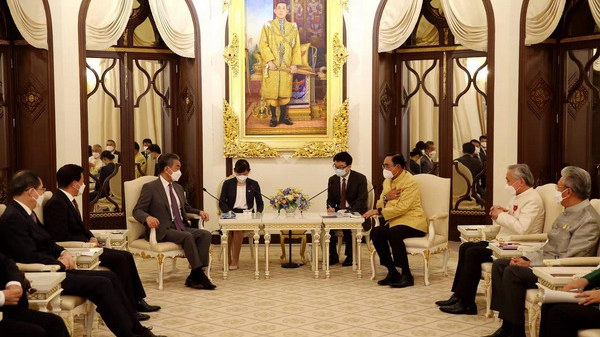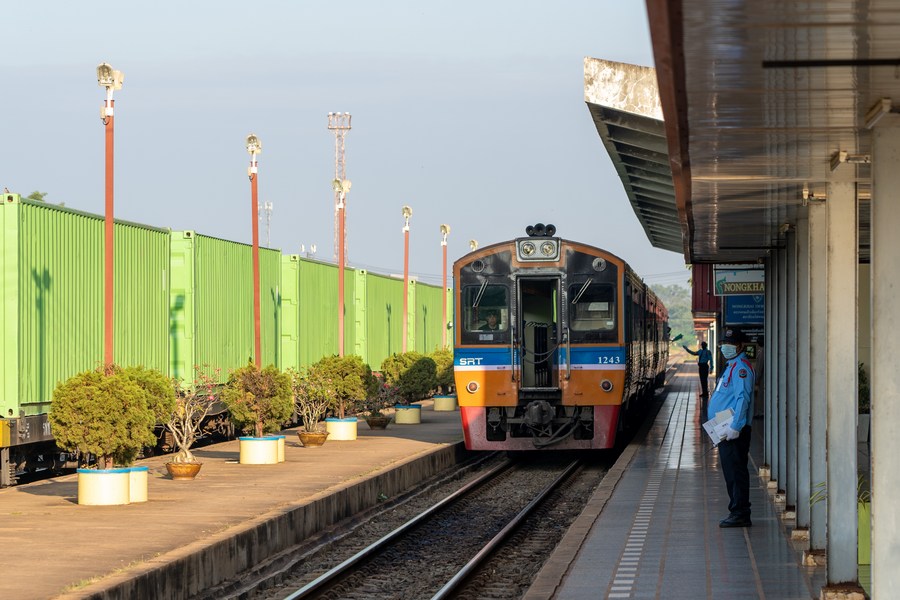
Chinese State Councilor and Foreign Minister Wang Yi (3rd L) speaks to Thai Prime Minister Prayut Chan-o-cha (3rd R) in Bangkok, Thailand, July 5, 2022. /Chinese Foreign Ministry
Chinese State Councilor and Foreign Minister Wang Yi (3rd L) speaks to Thai Prime Minister Prayut Chan-o-cha (3rd R) in Bangkok, Thailand, July 5, 2022. /Chinese Foreign Ministry
Editor's note: Hamzah Rifaat Hussain, a former visiting fellow at the Stimson Center in Washington and former assistant researcher at the Islamabad Policy Research Institute, is a TV anchor at Indus News in Pakistan. The article reflects the author's opinions and not necessarily those of CGTN.
In Bangkok, Chinese State Councilor and Foreign Minister Wang Yi and Thai Prime Minister Prayut Chan-o-cha agreed on the importance of carrying forward traditional friendships while expanding bilateral cooperation between the two countries. This year also marks the 10th anniversary since the establishment of comprehensive strategic cooperation between the two countries, and there is great potential of taking existing cooperation in 2022 to new heights.
China and Thailand have plenty to gain from expanding cooperation in 2022, with historical precedents dating back to 1975. Back then, trade became a dominant theme with neutrality as the bedrock of relations and Bangkok expressing an unwavering commitment to the one-China principle. Additionally, Thailand benefited from post-colonial economic development due to valuable contributions from the overseas Chinese business community in South East Asia.
In a world affected by deep polarization in 2022, China and Thailand should capitalize on these historical precedents and promote multilateral cooperation on issues such as cybersecurity challenges while complementing development strategies through the Belt and Road Initiative (BRI) and the Eastern Economic Corridor (EEC).
There are specific areas that both countries should explore in 2022 and for good reason. Firstly, expanding trade cooperation to offset economic slowdowns due to the pandemic and the Ukraine crisis is important. In 1999, bilateral trade stood at $4.22 billion, whereas 22 years later in 2021, China became Thailand's largest trading partner with bilateral trade reaching $103.75 billion. Apolitical trading ties in a global environment defined by increased polarization and economic shocks can benefit both countries immensely.
Secondly, China and Thailand can focus on peaceful development in the absence of hostilities by tapping into the Global Development Initiative (GDI) and the Global Security Initiative (GSI). Note that Prime Minister Chan-o-Cha attaches great importance to the proposed GDI as it draws attention to immediate challenges to global Sustainable Development Goals. Similarly the GSI has an unwavering commitment to respecting state sovereignty and promoting cooperative security for a more peaceful world, which aligns with foreign policy priorities of both countries.
The GSI and the GDI can promote greater linkages between the two countries as constructive frameworks aimed at promoting a more prosperous and peaceful world order. Thailand's status as a middle power in the region and an integral member of Association of Southeast Asian Nations makes it an important strategic partner in this regard.
Another area of cooperation is infrastructural development, which is critical for South East Asia's growing economic needs in the war era. Both Bangkok and Beijing have prioritized working towards building the China-Laos-Thailand railway, which can smoothe the flow of goods and services and facilitate the growth of industries with improved logistics. This opens up tourism routes and cross border transportation that benefits the region immensely.

A train arrives at Nong Khai Railway Station in Nong Khai province, Thailand, November 16, 2021. /Xinhua
A train arrives at Nong Khai Railway Station in Nong Khai province, Thailand, November 16, 2021. /Xinhua
Thailand also seeks to learn from development experiences in China, with Prime Minister Chan-o-Cha admiring China's remarkable achievements in addressing poverty and promoting regional integration. Similarly, a more sustainable, progressive future for soft power diplomacy between the two sides can take hold with the joint construction of the China-Thailand community act as a blueprint for a more sustainable, progressive and stable future for both populations as highlighted by Foreign Minister Wang Yi.
China and Thailand can also contribute positively Bangkok's vision for economic development. The "Thailand 4.0" development strategy, for example, can be linked with the BRI to thwart Bangkok's historical reliance on agriculture and light industries which has otherwise led to growing social inequities.
The four objectives of the vision involve ensuring environmental protection, enhancing social wellbeing by reducing societal disparities, promoting economic prosperity by investing 4 percent of Thailand's GDP in research and development, and raising the value of Thai citizens to become competent human beings in the 21st century; all of these can be greatly enhanced as regional connectivity will enable Bangkok to escape the middle income trap by developing growth hubs such as the $44 billion EEC and linking its different provinces as a regional gateway to Asia.
Furthermore, strategic convergence on peace in the Asia Pacific offers potential for the relationship. Thailand's role as the host country of APEC 2022 solidifies its position as a promoter of peace, dialogue, and sustainable cooperation.
Bangkok also shares Beijing's vision of constructing an Asia Pacific free trade zone and promoting greater regional integration in the absence of tensions. This is important, as the region cannot afford further polarization or militarization as impediments to regional prosperity. The agreements reached in 2022 are therefore especially relevant in this regard, as an open and prosperous Asia Pacific region benefits both sides.
Hence, there is immense potential to take the strategic partnership between China and Thailand forward. Historical precedents and specific areas of cooperation can boost regional trade, promote infrastructural development and implement visions for joint prosperity.
(If you want to contribute and have specific expertise, please contact us at opinions@cgtn.com. Follow @thouse_opinions on Twitter to discover the latest commentaries in the CGTN Opinion Section.)

